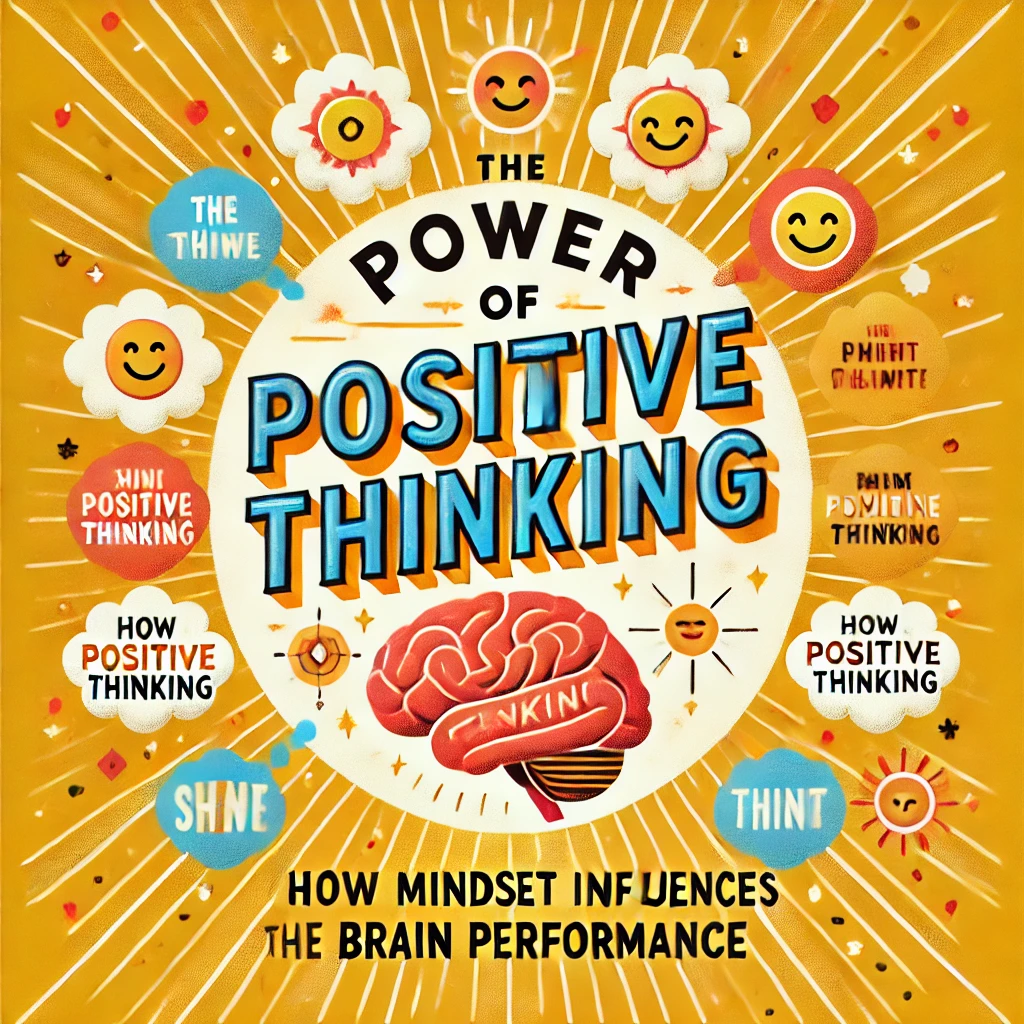Introduction
When it comes to brain power, most of us focus on diet, exercise, or mental training to boost cognitive abilities. But there’s another factor that plays a powerful role in shaping how our brains work: our mindset. Positive thinking can have a significant impact on mental performance, cognitive function, and even overall brain health. Research shows that the way we think about ourselves, our abilities, and our challenges can influence brain function, enhancing or limiting cognitive performance.
In this article, we’ll explore the science behind the power of positive thinking for brain health, discuss how a positive mindset can improve mental clarity and resilience, and provide practical tips to incorporate positivity into your daily life. Whether you’re aiming to boost mental performance or simply create a healthier mindset, these insights and techniques can help you harness the effects of positive thinking on brain function.
1. Understanding the Science: How Mindset Affects Brain Performance
The link between positive thinking and mental performance is rooted in brain chemistry. When we adopt a positive mindset, our brains release neurotransmitters like dopamine and serotonin, which enhance mood, increase motivation, and support cognitive function. Positive thinking can lead to greater resilience, improved problem-solving skills, and increased productivity.
The science of positivity and brain performance:
- Dopamine: Known as the “feel-good” neurotransmitter, dopamine is released when we experience joy or success, reinforcing behaviors that lead to positive outcomes.
- Serotonin: This neurotransmitter helps regulate mood, sleep, and memory, and higher levels of serotonin are often linked to greater mental clarity and a more positive outlook.
- Reduced Cortisol: Positive thinking lowers cortisol levels, the stress hormone that can impair cognitive function, allowing the brain to perform at its best.
Relatable anecdote:
A friend of mine used to dread speaking in meetings and would get extremely anxious beforehand. She decided to try reframing her mindset, focusing on the opportunity to share her ideas and learn from others rather than fearing judgment. Over time, her positivity helped her become more confident, and she even noticed that her focus and memory during meetings improved.
2. The Benefits of Positive Mindset for Brain Health
A positive mindset doesn’t just improve your mood—it can also improve brain performance by boosting cognitive function and helping you approach tasks with mental clarity. People who maintain a positive outlook are often better equipped to handle stress, adapt to change, and stay focused during challenging situations.
Benefits of a positive mindset for brain health:
- Enhanced focus and productivity: Positivity helps us stay motivated, making it easier to concentrate on tasks and achieve goals.
- Reduced mental fatigue: A positive outlook helps conserve cognitive resources, making it easier to perform tasks without feeling overwhelmed.
- Better memory retention: Studies show that people who engage in positive thinking are more likely to retain information and remember details accurately.
Example:
I used to get bogged down by the stress of balancing work and personal life. But when I started practicing gratitude and positive thinking, I found it easier to stay focused and productive, even on the busiest days. The mental clarity and resilience I gained were invaluable.
3. How Positive Thinking Influences Cognitive Abilities
Cognitive abilities like memory, learning, and problem-solving are all influenced by our mindset. Positive thinking encourages the brain to approach tasks with openness and curiosity, which enhances cognitive flexibility and creativity. When we believe in our capacity to learn and grow, our brains are more likely to absorb new information and retain it.
Ways positive thinking affects cognitive abilities:
- Improved problem-solving skills: A positive mindset fosters a “growth” mentality, allowing us to approach problems from different angles and consider creative solutions.
- Enhanced learning: Positivity promotes curiosity, making it easier to engage in learning activities and absorb new information.
- Increased adaptability: Positive thinkers are more likely to adapt to new situations, which improves cognitive flexibility and resilience.
Relatable anecdote:
My brother, who struggled with math, always approached it with dread. But once he started viewing each problem as a chance to learn rather than a test of his abilities, he found it easier to solve even complex equations. His positive mindset helped him tackle the subject with greater confidence, and his grades improved as a result.
4. Boost Mental Performance with a Positive Mindset: Practical Techniques
There are several strategies to cultivate a positive mindset and improve brain performance with positivity. These techniques are designed to shift your perspective, encourage optimism, and reinforce patterns of positive thinking that support cognitive health.
a) Practice Gratitude
Practicing gratitude is one of the simplest ways to foster a positive mindset. By focusing on what you’re thankful for, you create a shift in perspective that allows you to see opportunities rather than obstacles.
How gratitude affects the brain:
Gratitude releases dopamine and serotonin, boosting mood and enhancing cognitive function. When practiced regularly, gratitude can improve brain health by promoting mental clarity and emotional resilience.
Tips for practicing gratitude:
- Keep a gratitude journal and write down three things you’re grateful for each day.
- Reflect on positive experiences before going to bed, focusing on what went well.
- Share your gratitude with others, as expressing thanks can further reinforce positive thinking.
b) Use Positive Affirmations to Rewire Your Thinking
Affirmations are positive statements that you repeat to reinforce optimistic beliefs. Using affirmations can influence cognitive abilities by helping the brain focus on constructive thoughts and solutions rather than self-doubt or fear.
How affirmations work:
- They activate neural pathways associated with positivity, making it easier to maintain a positive mindset.
- Affirmations can help reduce stress and build confidence, which enhances mental clarity and focus.
Example:
Before taking on a challenging project, I repeat affirmations like, “I am capable and resourceful,” or “I can handle whatever comes my way.” These affirmations help me stay focused and approach tasks with a clear mind.
Tips for using affirmations:
- Choose affirmations that resonate with your goals and repeat them daily, especially in the morning.
- Write affirmations in your journal or display them on sticky notes in places you’ll see often.
- Focus on affirmations that promote a growth mindset, like “I am always learning” or “I can improve with effort.”
c) Engage in Mindfulness and Meditation
Mindfulness meditation encourages positive thinking by teaching you to stay present and approach situations without judgment. Studies show that regular meditation can increase brain performance, boost memory, and reduce mental fatigue, helping the brain remain calm and focused.
Benefits of mindfulness for brain performance:
- Reduces cortisol levels, which can impair cognitive function.
- Increases grey matter in areas of the brain associated with learning, memory, and emotional regulation.
- Helps improve attention and focus, making it easier to stay on task.
Relatable anecdote:
I started meditating for just five minutes each morning, and it’s had a big impact on my mindset. I feel less reactive, more focused, and better able to approach each day with a positive outlook.
How to practice mindfulness:
- Start with a short, guided meditation focused on breath or body awareness.
- Practice mindfulness during daily activities, like eating or walking, to train your brain to stay present.
- Gradually increase meditation sessions as you get comfortable, aiming for 10-15 minutes daily.
d) Focus on Self-Compassion
Being kind to yourself, especially during setbacks, is essential for maintaining a positive mindset. Self-compassion allows you to view challenges as learning experiences, which encourages resilience and boosts mental performance.
How self-compassion improves brain function:
- Increases resilience, helping the brain recover more quickly from stress.
- Promotes a growth mindset, which makes it easier to embrace challenges and adapt.
- Reduces anxiety and self-criticism, allowing for clearer thinking and better decision-making.
Example:
After making a mistake at work, I used to be overly critical of myself, which only made things worse. Practicing self-compassion helped me focus on the lesson rather than the setback, and I noticed that my problem-solving skills improved as I felt more confident.
Tips for practicing self-compassion:
- Reframe negative self-talk with kinder, more understanding statements.
- Acknowledge your efforts and recognize that mistakes are a part of growth.
- Remember that self-compassion isn’t about avoiding challenges but about approaching them with empathy.
5. The Effects of Positive Thinking on Brain Function: Long-Term Benefits
Positive thinking doesn’t just provide immediate mental clarity; it also has long-term benefits for brain health and cognitive resilience. By practicing positivity regularly, you reinforce neural pathways associated with optimism and reduce stress, which can protect against cognitive decline as you age.
Long-term benefits of a positive mindset for brain health:
- Reduced risk of cognitive decline: Positivity and lower stress levels are linked to a reduced risk of dementia and cognitive impairment.
- Improved emotional regulation: Positive thinking helps stabilize mood, making it easier to handle life’s ups and downs.
- Enhanced mental flexibility: By fostering a growth mindset, positive thinking increases adaptability, which is essential for cognitive health.
Relatable anecdote:
I know someone who always maintained a positive attitude, even in tough times, and at age 80, he still has an incredible memory and sharp wit. His approach to life shows just how impactful a positive mindset can be for long-term brain health.
Conclusion
The power of positive thinking for brain health is a tool that we all have within us. By cultivating a positive mindset, we can improve cognitive function, enhance mental clarity, and build resilience against stress. Whether through gratitude, affirmations, mindfulness, or self-compassion, there are numerous ways
to harness the effects of positive thinking on brain function.
Remember, positivity isn’t about ignoring life’s challenges; it’s about approaching them with a mindset that empowers rather than limits. Incorporate these practices into your daily routine, and you’ll likely notice improvements in your mental performance, clarity, and overall well-being.
FAQ Section
1. How does positive thinking improve brain performance?
Positive thinking boosts neurotransmitters like dopamine and serotonin, enhancing focus, motivation, and memory, which improves brain performance.
2. Can a positive mindset reduce stress?
Yes, a positive outlook lowers cortisol levels, helping the brain handle stress more effectively and promoting mental clarity.
3. How does mindset affect cognitive abilities?
A growth-oriented mindset encourages learning, adaptability, and creative problem-solving, enhancing cognitive abilities over time.
4. What are some ways to practice positive thinking?
Gratitude journaling, affirmations, mindfulness meditation, and self-compassion are effective ways to develop a positive mindset.
5. Can positive thinking improve memory?
Yes, positivity reduces stress and enhances neurotransmitter release, both of which support memory retention and mental clarity.
6. How long does it take to see results from positive thinking?
With consistent practice, many people notice improvements in mood and focus within a few weeks, while long-term benefits build over time.
7. Does positive thinking influence mental clarity?
Yes, positive thinking reduces mental clutter by minimizing self-doubt and focusing on growth, leading to improved mental clarity.
8. Can positivity protect against cognitive decline?
Studies suggest that positivity and stress reduction may help protect against age-related cognitive decline, promoting long-term brain health.
9. How does self-compassion help brain performance?
Self-compassion reduces anxiety and encourages resilience, allowing for better decision-making, problem-solving, and cognitive function.



